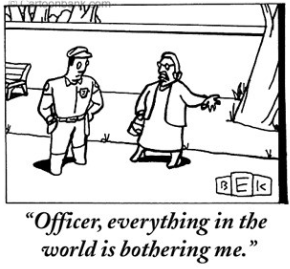 Hazy-white light from the east goes for sunshine on an early Thursday here on California’s north coast, as the rain predicted is supposedly still coming — according to the NWS, storms reportedly will form this morning over the interior, eastward in the Redding area, and then circular-like, be wind-driven our way in the afternoon.
Hazy-white light from the east goes for sunshine on an early Thursday here on California’s north coast, as the rain predicted is supposedly still coming — according to the NWS, storms reportedly will form this morning over the interior, eastward in the Redding area, and then circular-like, be wind-driven our way in the afternoon.
Rain seemingly in the neat future, and sometime shortly, I need to make a supply trip to Safeway and back — since still no vehicle, and I’m on foot, weather forecasts with the word ‘showers‘ included, much-less, ‘thunderstorms,’ tingle me with anxious moments, maybe some stress, even.
(Illustration found here).
Up here, one always must be wary of the weather. One example is the deceptive way-fine mist — the Humboldt Drizzle, I call it — that will soak your ass in a just a short space if you’re outside for any length of time. A walk to Safeway and back?
And the environmental mood along the coast can shift at any time — from sunshine and clear skies to fog and rain, sometimes faster than you can say, ‘Fuck!’
Just another area to focus my anxiety and stress. I stress on everything, though, which overall has most-likely fried some of my more-important brain cells over the years. And as nowadays, watching the world go directly to shit-in-a-wire basket don’t benefit stress, either. As I’ve stated on this blog before, there arises a peculiar, dream-like quality-stress to watching the end of an age on my laptop.
Yet supposedly stress can be good for you, if you handle it correctly, or something like that.
And what got me on the subject this morning was a new book published by psychologist Kelly McGonigal, “The Upside of Stress: Why Stress Is Good for You, and How to Get Good at It,” which says the core to stress is understanding it.
Via UPI this morning:
A teacher at Stanford University, McGonigal encountered indicators a few years ago that suggested stress is only bad for you only if you allow it to be.
“Stress is harmful, except when it’s not,” she says in the book.
“Choosing to see the upside in our most painful experiences is part of how we can change our relationship with stress.”
Some might think that’s an unusual concept, but experts say it’s hardly surprising once we are reminded how much power the mind holds over our lives.
The key in preventing damage, she says, is understanding the stress.
The book says many people deal with stress by unsuccessfully trying to ignore or suppress it.
That, McGonigal notes, is what invites harm.
However, she argues, recognizing why you are stressed, accepting it and becoming motivated to overcome it brings extremely healthy benefits.
In fact, McGonigal cites scientific research that suggests people who live with normal stress but do not view it negatively are the healthiest people of all.
Also, the book says, many people make the mistake of viewing stress as something to avoid rather than acknowledge: She says the proper mentality is to realize you’re stressing over something you care about something.
That, she says, invites good.
And if everything in the world is stressful-bothersome?
Also, McGonigal makes clear that you shouldn’t feel bad if you can’t process some stresses positively — because it’s not a ‘one stress fits all’ solution.
“You shouldn’t force a positive interpretation on every instance of suffering,” she writes.
“When stress feels against your will and out of your control, if it’s completely devoid of meaning and if it isolates you from others, that’s … a toxic relationship to stress.”
Stress is toxic itself.
Meanwhile, I’m off to Safeway while there’s even faded sunshine — sure as shit don’t want to overtax the nervous system…